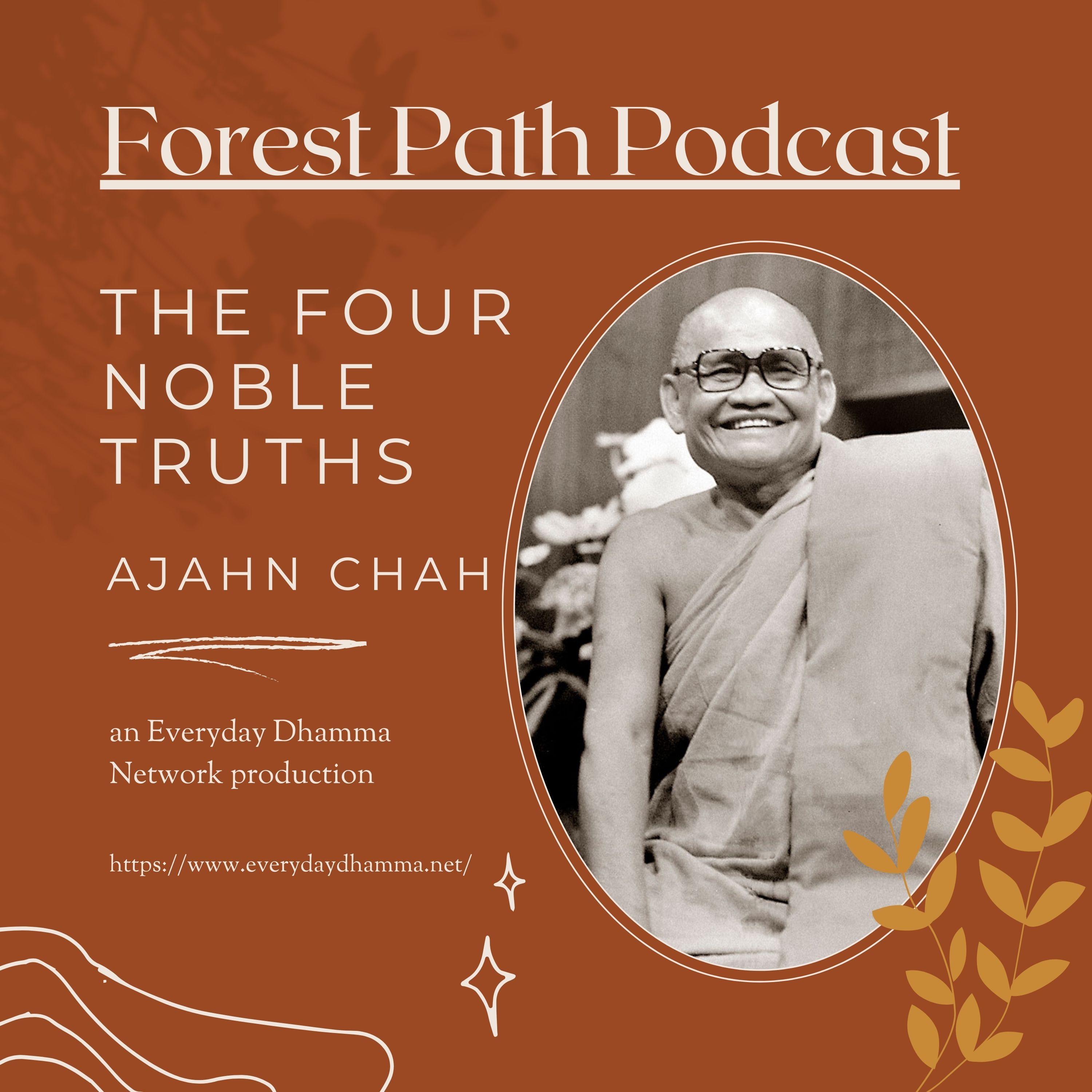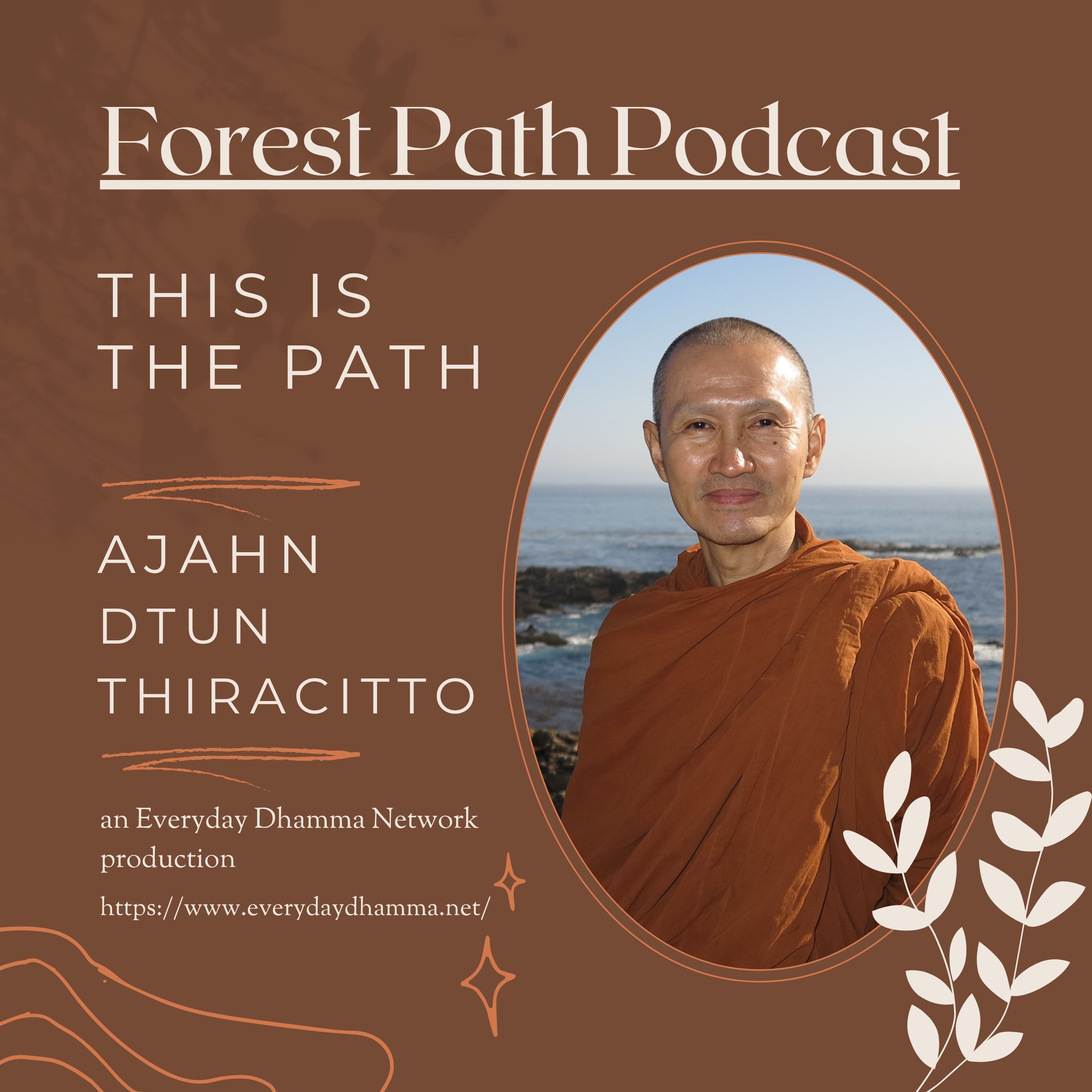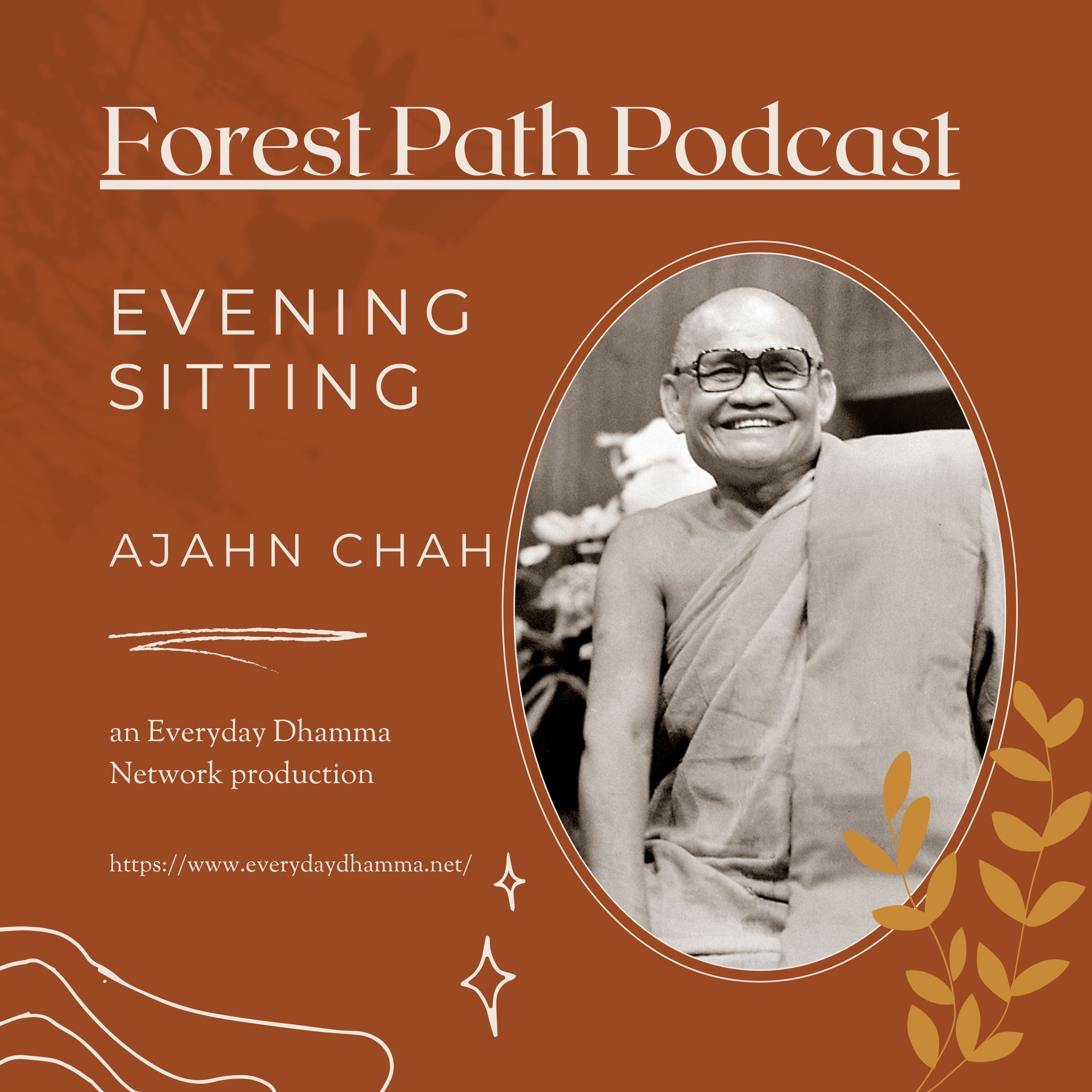Episode Transcript
THE FOUR NOBLE TRUTHS
Today I have been invited by the abbot to give you a teaching, so I ask you all to sit quietly and compose your minds. Due to the language barrier we must make use of a translator, so if you do not pay proper attention you may not understand.
My stay here has been very pleasant. Both the Master and you, his followers, have been very kind, all friendly and smiling, as befits those who are practicing the true Dhamma. Your property, too, is very inspiring, but so big! I admire your dedication in renovating it to establish a place for practicing the Dhamma.
Having been a teacher for many years now, I've been through my share of difficulties. At present there are altogether about forty branch monasteries2 of my monastery, Wat Nong Pah Pong, but even these days I have followers who are hard to teach. Some know but don't bother to practice, some don't know and don't try to find out. I don't know what to do with them. Why do human beings have minds like this? Being ignorant is not so good, but even when I tell them, they still don't listen. I don't know what more I can do. People are so full of doubts in their practice, they're always doubting. They all want to go to Nibbāna, but they don't want to walk the path. It's baffling. When I tell them to meditate they're afraid, or if not afraid then just plain sleepy. Mostly they like to do the things I don't teach. When I met the Venerable Abbot here I asked him what his followers were like. He said they're the same. This is the pain of being a teacher.
The teaching I will present to you today is a way to solve problems in the present moment, in this present life. Some people say that they have so much work to do they have no time to practice the Dhamma. ''What can we do?'' they ask. I ask them, ''Don't you breathe while you're working?'' ''Yes, of course we breathe!'' ''So how come you have time to breathe when you're so busy?'' They don't know what to answer. ''If you simply have sati while working you will have plenty of time to practice.''
Practicing meditation is just like breathing. While working we breathe, while sleeping we breathe, while sitting down we breathe... Why do we have time to breathe? Because we see the importance of the breath, we can always find time to breathe. In the same way, if we see the importance of meditation practice we will find the time to practice.
Have any of you ever suffered?... have you ever been happy?... Right here is the truth, this is where you must practice the Dhamma. Who is it who is happy? The mind is happy. Who suffers? The mind suffers. Wherever these things arise, that's where they cease. Have you experienced happiness?... Have you experienced suffering?... this is our problem. If we know suffering3, the cause of suffering, the end of suffering and the way leading to the end of suffering we can solve the problem.
There are two kinds of suffering: ordinary suffering and the extraordinary kind. Ordinary suffering is the suffering which is the inherent nature of conditions: standing is suffering, sitting is suffering, lying down is suffering. This is the suffering that is inherent in all conditioned phenomena. Even the Buddha experienced these things, he experienced comfort and pain, but he recognized them as conditions in nature. He knew how to overcome these ordinary, natural feelings of comfort and pain through understanding their true nature. Because he understood this ''natural suffering'' those feelings didn't upset him.
The important kind of suffering is the second kind, the suffering that creeps in from the outside, the ''extraordinary suffering.'' If we are sick we may have to get an injection from the doctor. When the needle pierces the skin there is some pain which is only natural. When the needle is withdrawn that pain disappears. This is like the ordinary kind of suffering, it's no problem, everybody experiences it. The extraordinary suffering is the suffering that arises from what we call upādāna, grasping onto things. This is like having an injection with a syringe filled with poison. This is no longer an ordinary kind of pain, it is the pain which ends in death. This is similar to the suffering which arises from grasping.
Wrong view, not knowing the impermanent nature of all conditioned things, is another kind of problem. Conditioned things are the realm of samsāra4. Not wanting things to change - if we think like this we must suffer. When we think that the body is ourselves or belonging to us, we are afraid when we see it change. Consider the breath: once it comes in it must go out, having gone out it must come in again. This is its nature, this is how we manage to live. Things don't function in that way. This is how conditions are but we don't realize it.
Suppose we lost something. If we thought that object was really ours, we would brood over it. If we couldn't see it as a conditioned thing faring according to the laws of nature we would experience suffering. But if you breathe in, can you live? Conditioned things must naturally change in this way. To see this is to see the Dhamma, to see aniccam, change. We live dependent on this change. When we know how things are then we can let go of them.
The practice of Dhamma is to develop an understanding of the way of things so that suffering doesn't arise. If we think wrongly we are at odds with the world, at odds with the Dhamma and with the truth. Suppose you were sick and had to go into hospital. Most people think, ''Please don't let me die, I want to get better.'' This is wrong thinking, it will lead to suffering. You have to think to yourself, ''If I recover I recover, if I die I die.'' This is right thinking, because you can't ultimately control conditions. If you think like this, whether you die or recover, you can't go wrong, you don't have to worry. Wanting to get better at all costs and afraid of the thought of dying... this is the mind which doesn't understand conditions. You should think, ''If I get better that's fine, if I don't get better that's fine.'' This way we can't go wrong, we don't have to be afraid or cry, because we have tuned ourselves in to the way things are.
The Buddha saw clearly. His teaching is always relevant, never out-dated. It never changes. In the present day it's still the way it is, it hasn't changed. By taking this teaching to heart we can gain the reward of peace and well-being.
In the teachings there is the reflection of ''not-self'': ''this is not my self, this does not belong to me.'' But people don't like to listen to this kind of teaching because they are attached to the idea of self. This is the cause of suffering. You should take note of this.
Today a woman asked about how to deal with anger. I told her that the next time she gets angry, to wind up her alarm clock and put it in front of her. Then to give herself two hours for the anger to go away. If it was really her anger she could probably tell it to go away like this: ''In two hours be gone!'' But it isn't really ours to command. Sometimes in two hours it's still not gone, at other times in one hour it's gone already. Holding onto anger as a personal possession will cause suffering. If it really belonged to us it would have to obey us. If it doesn't obey us that means it's only a deception. Don't fall for it. Whether the mind is happy or sad, don't fall for it. Whether the mind loves or hates, don't fall for it, it's all a deception.
Have any of you ever been angry? When you are angry does it feel good or bad? If it feels bad then why don't you throw that feeling away, why bother to keep it? How can you say that you are wise and intelligent when you hold on to such things? Since the day you were born, how many times has the mind tricked you into anger? Some days the mind can even cause a whole family to quarrel, or cause you to cry all night. And yet we still continue to get angry, we still hold onto things and suffer. If you don't see suffering you will have to keep suffering indefinitely, with no chance for respite. The world of samsāra is like this. If we know the way it is we can solve the problem.
The Buddha's teaching states that there is no better means to overcome suffering than to see that ''this is not my self,'' ''this is not mine.'' This is the greatest method. But we don't usually pay attention to this. When suffering arises we simply cry over it without learning from it. Why is that so? We must take a good hard look at these things, to develop the Buddho, the one who knows.
Take note, some of you may not be aware that this is Dhamma teaching. I'm going to give you some Dhamma that's outside the scriptures. Most people read the scriptures but don't see the Dhamma. Today I am going to give you a teaching that's outside the scriptures. Some people may miss the point or not understand it.
Suppose two people are walking together and see a duck and a chicken. One of them says, ''Why isn't that chicken like the duck, why isn't the duck like the chicken?'' He wants the chicken to be a duck and the duck to be a chicken. It's impossible. If it's impossible, then even if that person were to wish for the duck to be a chicken and the chicken to be a duck for the rest of his life it would not come to pass, because the chicken is a chicken and the duck is a duck. As long as that person thought like that he would suffer. The other person might see that the chicken is a chicken and the duck is a duck, and that's all there is to it. There is no problem. He sees rightly. If you want the duck to be a chicken and the chicken to be a duck you are really going to suffer.
In the same way, the law of aniccam states that all things are impermanent. If you want things to be permanent you're going to suffer. Whenever impermanence shows itself you're going to be disappointed. One who sees that things are naturally impermanent will be at ease, there will be no conflict. The one who wants things to be permanent is going to have conflict, maybe even losing sleep over it. This is to be ignorant of aniccam, impermanence, the teaching of the Buddha.
If you want to know the Dhamma where should you look? You must look within the body and the mind. You won't find it in the shelves of a bookcase. To really see the Dhamma you have to look within your own body and mind. There are only these two things. The mind is not visible to the physical eye, it must be seen with the ''mind's eye.'' Before the Dhamma can be realized you must know where to look. The Dhamma that is in the body must be seen in the body. And with what do we look at the body? We look at the body with the mind. You won't find the Dhamma looking anywhere else, because both happiness and suffering arise right here. Or have you seen happiness arising in the trees? Or from the rivers, or the weather? Happiness and suffering are feelings which arise in our own bodies and minds.
Therefore the Buddha tells us to know the Dhamma right here. The Dhamma is right here, we must look right here. The Master may tell you to look at the Dhamma in the books, but if you think that this is where the Dhamma really is, you'll never see it. Having looked at the books you must reflect on those teachings inwardly. Then you can understand the Dhamma. Where does the real Dhamma exist? It exists right here in this body and mind of ours. This is the essence of contemplation practice.
When we do this, wisdom will arise in our minds. When there is wisdom in our minds, then no matter where we look there is Dhamma, we will see aniccam, dukkham, and anattā at all times. Aniccam means transient. Dukkham - if we cling to the things that are transient we must suffer, because they are not us or ours (anattā). But we don't see this, we always see them as being our self and belonging to us.
This means that you don't see the truth of convention. You should understand conventions. For example, all of us sitting here have names. Are our names born with us or are they assigned to us afterwards? Do you understand? This is convention. Is convention useful? Of course it's useful. For example, suppose there are four men, A, B, C, and D. They all must have their individual names for convenience in communicating and working together. If we wanted to speak to Mr. A we could call Mr. A and he would come, not the others. This is the convenience of convention. But when we look deeply into the matter we will see that really there isn't anybody there. We will see transcendence. There is only earth, water, wind and fire, the four elements. This is all there is to this body of ours.
But we don't see it in this way because of the clinging power of Attavādupādāna5. If we were to look clearly we would see that there isn't really much to what we call a person. The solid part is the earth element, the fluid part is the water element, the part which provides heat is called the fire element. When we break things down we see that there is only earth, water, wind and fire. Where is the person to be found? There isn't one.
That's why the Buddha taught that there is no higher practice than to see that ''this is not my self and does not belong to me.'' They are simply conventions. If we understand everything clearly in this way we will be at peace. If we realize in the present moment the truth of impermanence, that things are not our self or belonging to us, then when they disintegrate we are at peace with them, because they don't belong to anybody anyway. They are merely the elements of earth, water, wind and fire.
It's difficult for people to see this, but even so it's not beyond our ability. If we can see this we will find contentment, we will not have so much anger, greed or delusion. There will always be Dhamma in our hearts. There will be no need for jealousy and spite, because everybody is simply earth, water, wind and fire. There's nothing more to them than this. When we accept this truth we will see the truth of the Buddha's teaching.
If we could see the truth of the Buddha's teaching we wouldn't have to use up so many teachers! It wouldn't be necessary to listen to teachings every day. When we understand then we simply do what's required of us. But what makes people so difficult to teach is that they don't accept the teaching and argue with the teachers and the teaching. In front of the teacher they behave a little better, but behind his back they become thieves! People are really difficult to teach. The people in Thailand are like this, that's why they have to have so many teachers.
Be careful, if you're not careful you won't see the Dhamma. You must be circumspect, taking the teaching and considering it well. Is this flower pretty?... Do you see the ugliness within this flower?... For how many days will it be pretty?... What will it be like from now on?... Why does it change so?... In three or four days you have to take it and throw it away, right? It loses all its beauty. People are attached to beauty, attached to goodness. If anything is good they just fall for it completely. The Buddha tells us to look at pretty things as just pretty, we shouldn't become attached to them. If there is a pleasant feeling we shouldn't fall for it. Goodness is not a sure thing, beauty is not a sure thing. Nothing is certain. There is nothing in this world that is a certainty. This is the truth. The things that aren't true are the things that change, such as beauty. The only truth it has is in its constant changing. If we believe that things are beautiful, when their beauty fades our mind loses its beauty too. When things are no longer good our mind loses its goodness too. When they are destroyed or damaged we suffer because we have clung to them as being our own. The Buddha tells us to see that these things are simply constructs of nature. Beauty appears and in not many days it fades. To see this is to have wisdom.
Therefore we should see impermanence. If we think something is pretty we should tell ourselves it isn't, if we think something is ugly we should tell ourselves it isn't. Try to see things in this way, constantly reflect in this way. We will see the truth within untrue things, see the certainty within the things that are uncertain.
Today I have been explaining the way to understand suffering, what causes suffering, the cessation of suffering and the way leading to the cessation of suffering. When you know suffering you should throw it out. Knowing the cause of suffering you should throw it out. Practice to see the cessation of suffering. See aniccam, dukkham and anattā and suffering will cease.
When suffering ceases where do we go? What are we practicing for? We are practicing to relinquish, not in order to gain anything. There was a woman this afternoon who told me that she is suffering. I asked her what she wants to be, and she said she wants to be enlightened. I said, ''As long as you want to be enlightened you will never become enlightened. Don't want anything.''
When we know the truth of suffering we throw out suffering. When we know the cause of suffering then we don't create those causes, but instead practice to bring suffering to its cessation. The practice leading to the cessation of suffering is to see that ''this is not a self,'' ''this is not me or them.'' Seeing in this way enables suffering to cease. It's like reaching our destination and stopping. That's cessation. That's getting close to Nibbāna. To put it another way, going forward is suffering, retreating is suffering and stopping is suffering. Not going forward, not retreating and not stopping... is anything left? Body and mind cease here. This is the cessation of suffering. Hard to understand, isn't it? If we diligently and consistently study this teaching we will transcend things and reach understanding, there will be cessation. This is the ultimate teaching of the Buddha, it's the finishing point. The Buddha's teaching finishes at the point of total relinquishment.
Today I offer this teaching to you all and to the Venerable Master also. If there is anything wrong in it I ask your forgiveness. But don't be in a hurry to judge whether it is right or wrong, just listen to it first. If I were to give you all a fruit and tell you it's delicious, you should take note of my words, but don't believe me offhand, because you haven't tasted it yet. The teaching I give you today is the same. If you want to know whether the ''fruit'' is sweet or sour you have to slice a piece off and taste it. Then you will know its sweetness or sourness. Then you could believe me, because then you'd have seen for yourself. So please don't throw this ''fruit'' away, keep it and taste it, know its taste for yourself.
The Buddha didn't have a teacher, you know. An ascetic once asked him who his teacher was, and the Buddha answered that he didn't have one6. The ascetic just walked off shaking his head. The Buddha was being too honest. He was speaking to one who couldn't know or accept the truth. That's why I tell you not to believe me. The Buddha said that to simply believe others is foolish, because there is no clear knowing within. That's why the Buddha said ''I have no teacher.'' This is the truth. But you should look at this it the right way. If you misunderstand it you won't respect your teacher. Don't go saying ''I have no teacher.'' You must rely on your teacher to tell you what is right and wrong, and then you must practice accordingly.
Today is a fortunate day for all of us. I have had a chance to meet with all of you and the Venerable Master. You wouldn't think that we could meet like this because we live so far apart. I think there must be some special reason that we have been able to meet in this way. The Buddha taught that everything that arises must have a cause. Don't forget this. There must be some cause. Perhaps in a previous existence we were brothers and sisters in the same family. It's possible. Another teacher didn't come, but I did. Why is that? Perhaps we are creating the causes in the present moment itself. This is also possible.
I leave you all with this teaching. May you be diligent and arduous in the practice. There is nothing better than the practice of Dhamma, Dhamma is the supporter of the whole world. People are confused these days because they do not know the Dhamma. If we have the Dhamma with us we will be content. I am happy to have had this opportunity to help you and the venerable teacher in developing the practice of Dhamma. I leave you with my heartfelt good wishes. Tomorrow I will be leaving, I'm not sure where for. This is only natural. When there is coming there must be going, when there is going there must be coming. This is how the world is. We shouldn't be overjoyed or upset by the changes in the world. There is happiness and then there is suffering; there is suffering and then there is happiness; there is gain and then there is loss; there is loss and then there is gain. This is the way things are.
In the Buddha's time there were disciples of the Buddha who didn't like him, because the Buddha exhorted them to be diligent, to be heedful. Those who were lazy were afraid of the Buddha and resented him. When he died, one group of disciples cried and were distressed that they would no longer have the Buddha to guide them. These ones were still not clever. Another group of disciples were pleased and relieved that they would no longer have the Buddha on their backs telling them what to do. A third group of disciples were equanimous. They reflected that what arises passes away as a natural consequence. There were these three groups. Which group do you identify with? Do you want to be one of the pleased ones or what? The group of disciples who cried when the Buddha passed away had not yet realized the Dhamma. The second group were those who resented the Buddha. He was always forbidding them from doing the things they wanted to do. They lived in fear of the Buddha's scorn and reprimands, so when he passed away they were relieved.
These days things aren't much different. It's possible that the teacher here has some followers who are resentful towards him. They might not show it outwardly but it's there in the mind. It's normal for people who still have defilements to feel this way. Even the Buddha had people hating him. I myself have followers who resent me also. I tell them to give up evil actions but they cherish their evil actions. So they hate me. There are plenty like this. May all of you who are intelligent make yourselves firm in the practice of Dhamma.




